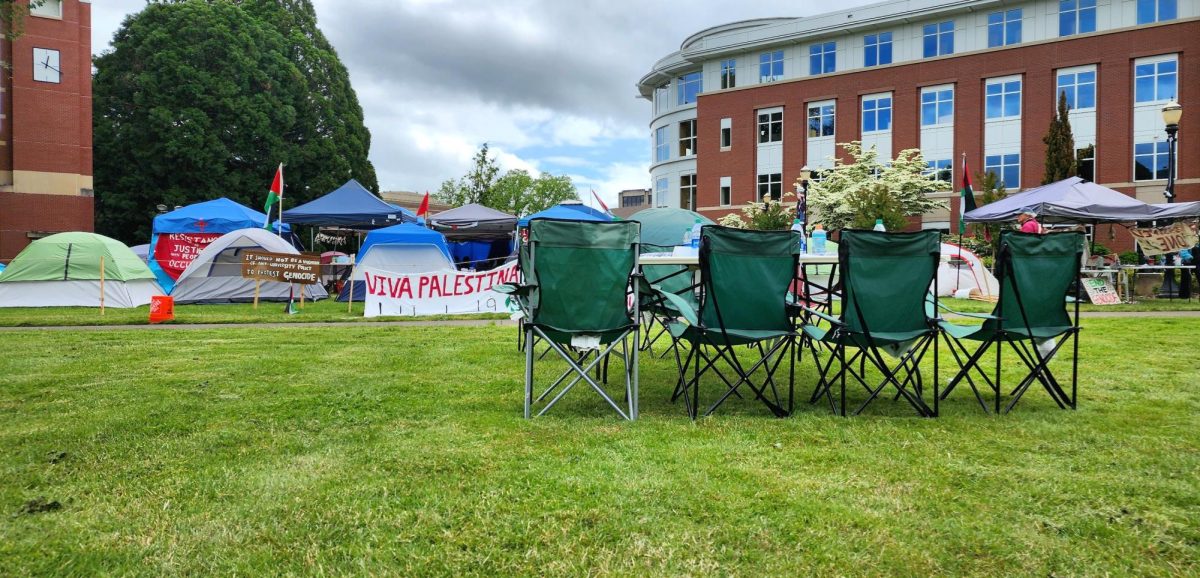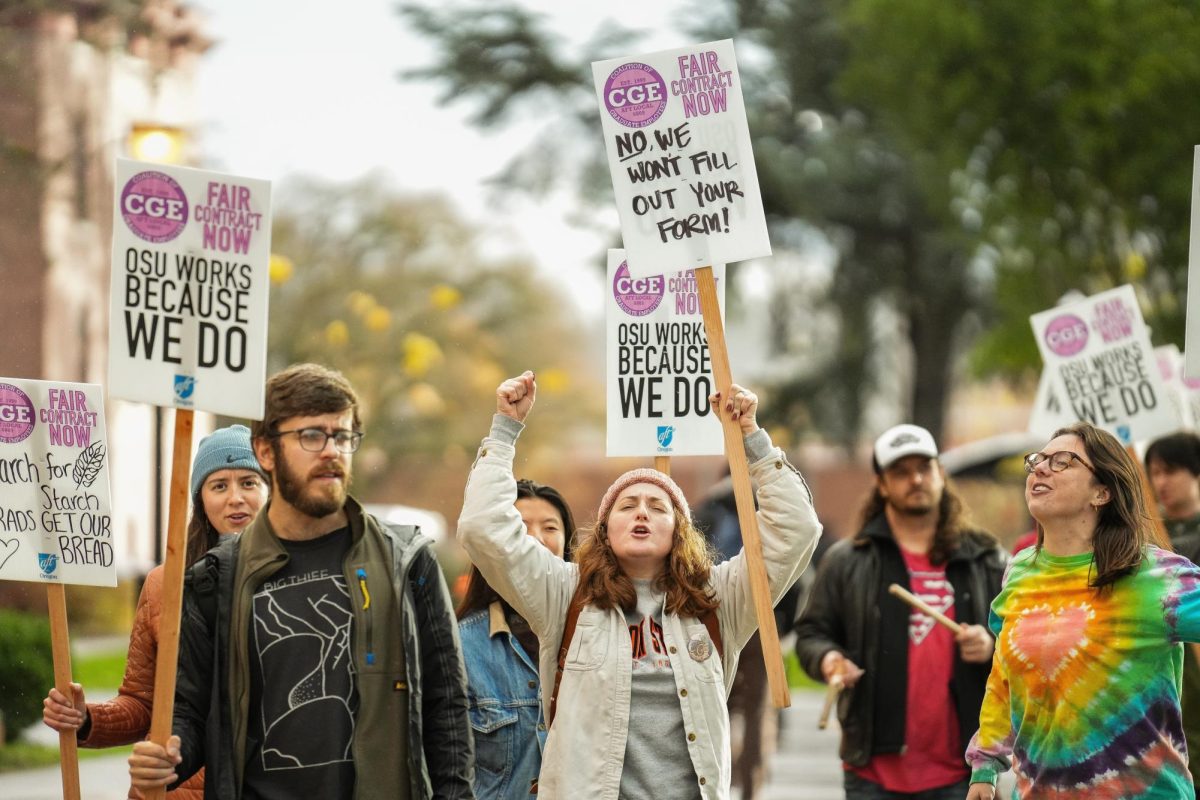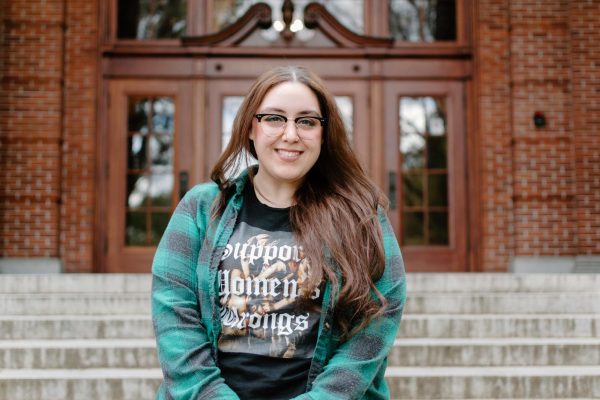Students United for Palestinian Equal Rights at Oregon State University called for a public meeting with OSU administrators to discuss the terms of their encampment and what will happen to student participants on June 2.
The encampment moved to the Valley Library lawn on May 29, where before it had been stationed in the Memorial Union quad.
“We demand open and good-faith negotiations with President Murthy, Provost Ed Feser, Vice Provost for Student Affairs Dan Larson, and Vice President for University Relations Rob Odom,” SUPER stated on Instagram. “We will not be intimidated, manipulated, nor tired out when it comes to calling for disclosure and divestment in companies that profit from genocide and for amnesty for all participants of the Palestine Solidarity Encampment.”
SUPER set up tables outside the encampment on the Valley Library quad with nameplates on each seat for administrators.
However, President Murthy and other administrators did not come to negotiate.
The crowd of nearly 100 demonstrators stood around as speakers and organizers addressed the crowd.
“Every single conversation has been in bad faith every single time because their (OSU administrations) demands spit in our face. So, we are the ones being ‘non-compliant’ when we’re not even asking for the bare minimum,” a SUPER speaker said. “It’s genuinely disgusting that they look at the bottom line and say, ‘We can go lower than that, let’s do that.’ They keep threatening us. They keep pushing us. We’re going to keep pushing back. I’m honestly so proud of everyone who’s kept going, who stayed here.”
On May 31, Dean of Students Kevin Dougherty and OSU PD Chief Shanon Anderson visited the encampment. SUPER claimed on Instagram this is the first visit in over a week from any administrator since sending counter proposals and moving the encampment.
According to SUPER, Dougherty asked that the encampment be taken down by 9 p.m. on May 31 providing the stipulation that if not, SUPER organizers and all students participating in the encampment would have criminal charges made against them.
SUPER also claimed that Dougherty has alleged that the encampment caused $2,000 worth of damages to the Memorial Union quad, making the encampment a “Class C Felony.”
SUPER claimed that when the group asked Dougherty to provide specifics of the damages caused at the MU quad, Dougherty did not offer proof.
While Dougherty did not respond to a request for comment, Vice President for University Relations and Marketing Rob Odom responded on behalf of Dougherty to address the allegations made by SUPER.
“OSU is not in negotiations with encampment participants, we will continue to listen and actively engage with members of the overnight encampment and its supporters,” Odom said.
As for the concerns that SUPER has about the Class C felony charges which SUPER claimed Doughtery said would be brought against them, Odom said students were informed of specific measures being implemented.
“Administrative leaders had (a conversation) Friday during which encampment participants were informed of progressive discipline and accountability measures associated with persistent violation of university policies and the law,” Odom said.
SUPER claimed Dougherty has engaged in what they called “scare tactics” and told SUPER that taking down the encampment would be a “positive mitigating factor” for students who have Student Code of Conduct violations on their records.
Aside from employing scare tactics, SUPER also claimed that Dougherty is trying to divide the encampment participants.
SUPER wrote in their claim that Dougherty said he has personally contacted students in the encampment who say they are “tired” and want to disband with the “sole demand of amnesty.”
SUPER said they do not believe Dougherty’s claim.
Another claim SUPER addressed was that students in the encampment are asking United States Postal Service and United Parcel Service workers for building keys, “as though we (SUPER) were planning to occupy a building,” which they said was unfounded.
“These things were said to cause division within our group with the hope that we adhere to his (Dougherty’s) threats and disband,” the Instagram post claims.
Odom and the administration hope that SUPER, encampment participants and all other student organizations will join university-wide efforts to “address the concerns” of the protestors.
Odom also hopes the encampment participants will decamp so that they will no longer be sanctioned for Code of Student Conduct violations and criminal charges.
However, when it came to addressing the concern of students being offered amnesty if they decamped and “disbanded” from SUPER, Odom said it would present a problem.
“With respect to the demand of ‘amnesty,’ it would be inappropriate and a highly problematic precedent to selectively apply university policies based on the viewpoint of individuals and groups,” Odom said.
Murthy sent an email to the OSU community just before the public negotiations were supposed to take place.
In the email, Murthy described OSU’s response to the conflict happening in Gaza and Israel and how the conflict has affected the OSU community, detailing the launch of a new website with relevant information.
Murthy also acknowledged the demands from those involved in the encampment.
“Participants in an overnight encampment on the Valley Library Quad have made additional demands of the university, several of which are at odds with our public mission and commitment to academic freedom and free expression,” Murthy said. “In developing these actions, the university took seriously the concerns expressed by representatives of the encampment and consistently invited encampment participants to join with others in the OSU community in contributing to the implementation and to disband the overnight encampment. At this time, these invitations have not been accepted by encampment representatives.”
SUPER’s media coordinator Masha, who declined to give their last name for safety reasons, said that this statement is not true.
“We keep asking for negotiations with higher administration and they ignore us. We reject their deals because they’re bad,” Masha said.
The issue, Masha added, is not that OSU administrators won’t speak to SUPER, but that administrators in higher positions won’t sit down and have good-faith negotiations with SUPER and the other student organizations participating in the encampment.
For now, SUPER is prepared to wait and continue rallying until Murthy and the OSU administration speak to them in good faith.
“We are not going to cave into these threats,” SUPER said. “We are not going to stop.”



















































































































